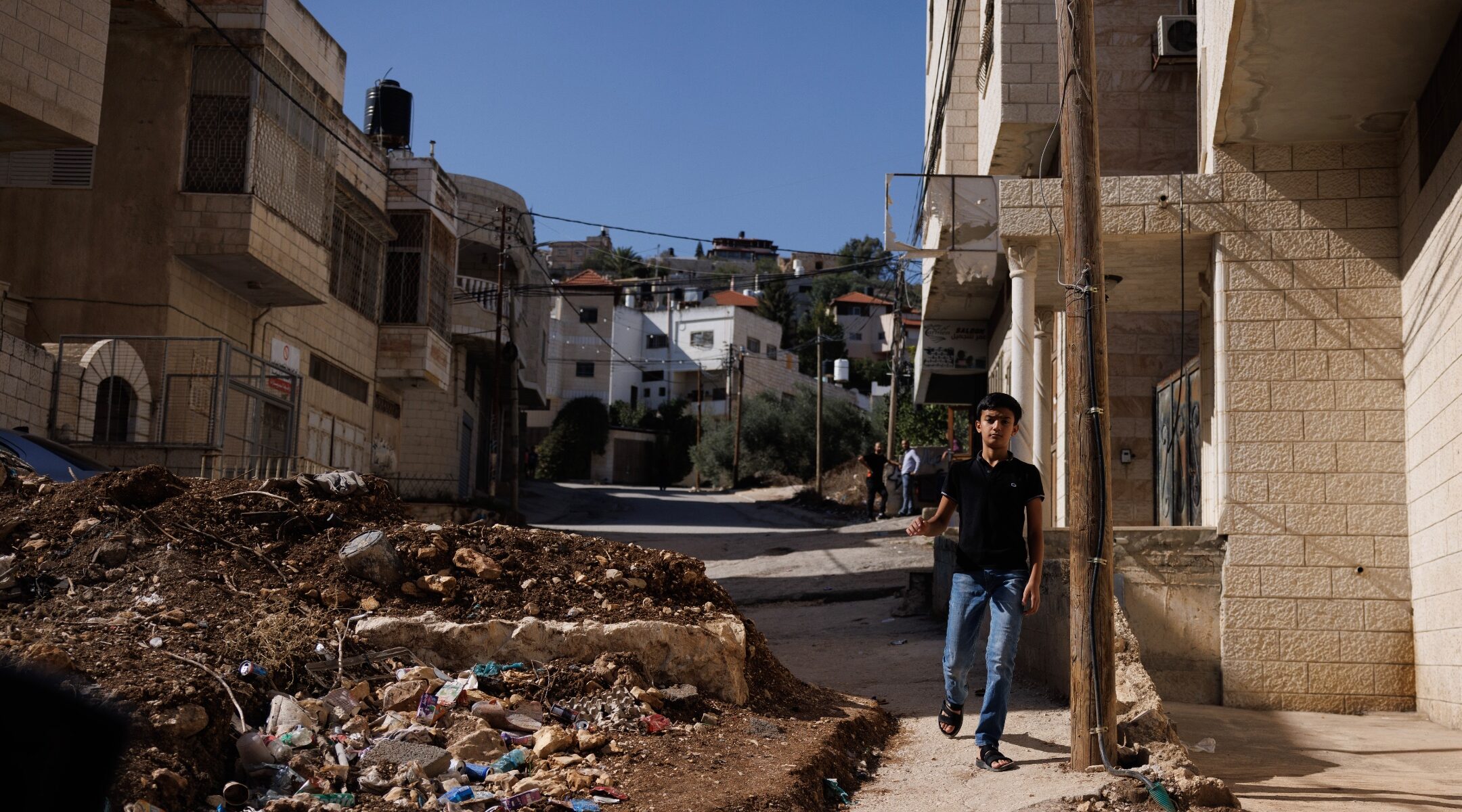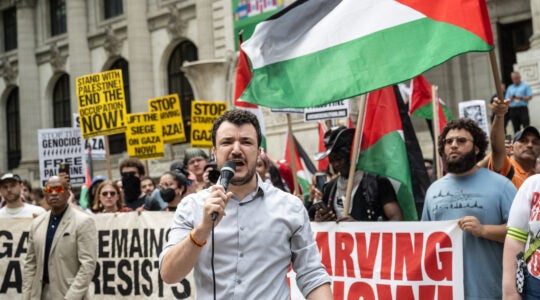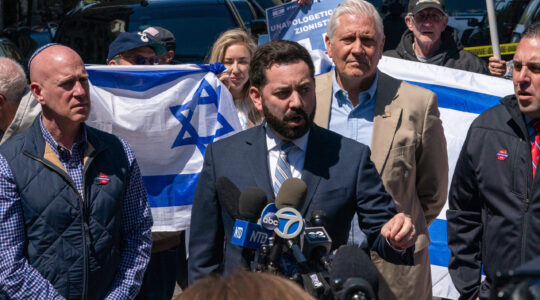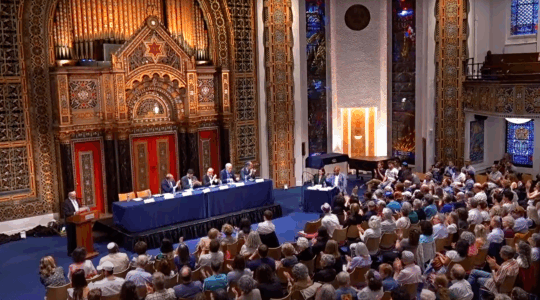WASHINGTON (JTA) — President Joe Biden ordered strict sanctions on four Israeli West Bank settlers for alleged violence against Palestinians and Israeli peace activists.
Biden’s executive order Thursday represented an escalation of the diplomacy and pressure he has exerted on Israeli Prime Minister Benjamin Netanyahu to rein in extremists. A White House statement framed the action as a parallel to the multiple sanctions Biden has levied against officials of Hamas, the terror group that launched the war with a wave of massacres in Israel on Oct. 7.
“Since October 7, the United States has issued five rounds of sanctions against Hamas, including the most recent round of sanctions against Hamas last week,” the White House said in a statement. “President Biden has also spoken about his concern about the rise in violence that we have seen in the West Bank from extremist actors — in particular the rise in extremist settler violence, which reached record levels in 2023. This violence poses a grave threat to peace, security, and stability in the West Bank, Israel, and the Middle East region, and threatens the national security and foreign policy interests of the United States.”
Netanyahu immediately said the order was not necessary. “Israel acts against all Israelis who break the law, everywhere; therefore, exceptional measures are unnecessary,” his office said in a statement.
The sanctions essentially bar the four settlers from transactions that involve the U.S. financial system, and make it nearly impossible for them to carry out business with U.S. dollars. The Biden administration in December levied visa restrictions on settlers found to be involved in attacks.
The four named settlers are: David Chai Chasdai, who allegedly led a riot in the Palestinian village of Huwara resulting in the death of a Palestinian; Shalom Zicherman, who allegedly attacked Israeli peace activists in the West Bank; Yinon Levy, who allegedly intimidated and assaulted Palestinians in order to drive them from their lands; and Einan Tanjil, who allegedly assaulted Palestinians and Israeli peace activists.
The United Nations Office of Humanitarian Affairs has reported that settlers have killed at least eight Palestinians and wounded more than 100 since Oct. 7.
Biden has embraced Israel since the launch of the war, accelerating arms transfers, relaying ships to the region to deter others from joining the war, and supporting Israel in international forums such as the United Nations. The United States is also leading airstrikes against Houthi militants in Yemen who have been targeting commercial ships in the Red Sea, ostensibly in solidarity with the Palestinians.
But Biden has also grown increasingly exasperated with Netanyahu, who has publicly rejected any post-war scenario that would lead to Palestinian statehood, a key Biden priority. Netanyahu was slow to respond to U..S. requests to accelerate the entry of humanitarian assistance into the Gaza Strip and to conduct a more targeted war inside Gaza.
According to the Hamas-run health ministry in Gaza, more than 26,000 Palestinians have been killed since Israel launched counterstrikes following Oct, 7, when Hamas killed some 1,200 people, brutalized thousands more and took more than 250 people hostage. Israel says about a third of the Palestinian dead are combatants. The coastal enclave is on the verge of mass famine, international aid organizations have said. In addition, most of its homes are destroyed and most of its people are displaced.
Most galling to Biden however, has been Netanyahu’s unwillingness to rein in far-right members of his cabinet. Biden had called on Netanyahu to disavow his far-right partners before the war, and to control rising anti-Palestinian violence in the West Bank.
Biden reportedly considered sanctioning Itamar Ben-Gvir, the national security minister who has been convicted of terrorist-related activity, is a former follower of late extremist Rabbi Meir Kahane and praised the extrajudicial killing of a Palestinian by a settler extremist earlier this year.
But Biden decided against levying sanctions on Ben-Gvir, Axios reported. Biden also considered sanctioning Bezalel Smotrich, the far-right minister responsible for the West Bank.
Smotrich lashed out at the order on X, the platform formerly known as Twitter, saying that it amounted to targeting the entire settlement movement.
“The ‘settler violence’ campaign is an antisemitic lie spread by the enemies of Israel to smear and harm the movement of settler pioneers,” Smotrich said. “Too bad the Biden administration is participating in this action while settlers are paying a steep price in the blood of their children in the war in Gaza.”
Smotrich said he would not stop in his efforts to prevent the establishment of a Palestinian state and to expand settlements. “If the price I pay is American sanctions imposed on me, so be it,” he said.
A senior administration official, briefing reporters on Thursday just before the executive order was released, suggested that Biden was frustrated with Netanyahu’s disregard for the pleas of Israel’s most important ally.
“The president has also spoken about his concern repeatedly and consistently, publicly, and also in almost every diplomatic conversation he has with Israeli leaders about the rise in violence that we have seen in the West Bank from extremist factors,” the officials said. “And these actions pose a grave threat to peace, security and stability in the West Bank, Israel, and the Middle East region, and they also obstruct the realization of, ultimately, an independent Palestinian state sitting side by side with the State of Israel.”
The order came on the day Biden traveled to campaign for reelection in Michigan, a key swing state where he overwhelmingly won the substantial Arab-American vote in 2020. There is an organized campaign in the state to persuade voters to vote neither for Biden nor for his presumptive rival, former President Donald Trump, because of anger with Biden over his support for Israel.
It was not immediately clear if any of the four named settlers have U.S. ties, but the order puts on notice any organization in the United States found to have funded any movement associated with the violence.
Individuals or organizations found “to have materially assisted, sponsored, or provided financial, material, or technological support for, or goods or services to or in support of, any person blocked pursuant to the order” will face the same sanctions, the order said.
The Financial Crimes Enforcement Network, an arm of the U.S. Treasury, immediately following the order’s release advised financial institutions to flag “payments to any organizations or groups, including nonprofit organizations that are now or have been previously linked to violent extremist groups in the West Bank.”
The Jewish Federations of North America said it was examining the executive order and the Treasury Department’s advisory.
“We are reviewing the matter and will be issuing guidance once we have a thorough understanding,” a spokesman said.
JTA has documented Jewish history in real-time for over a century. Keep our journalism strong by joining us in supporting independent, award-winning reporting.






